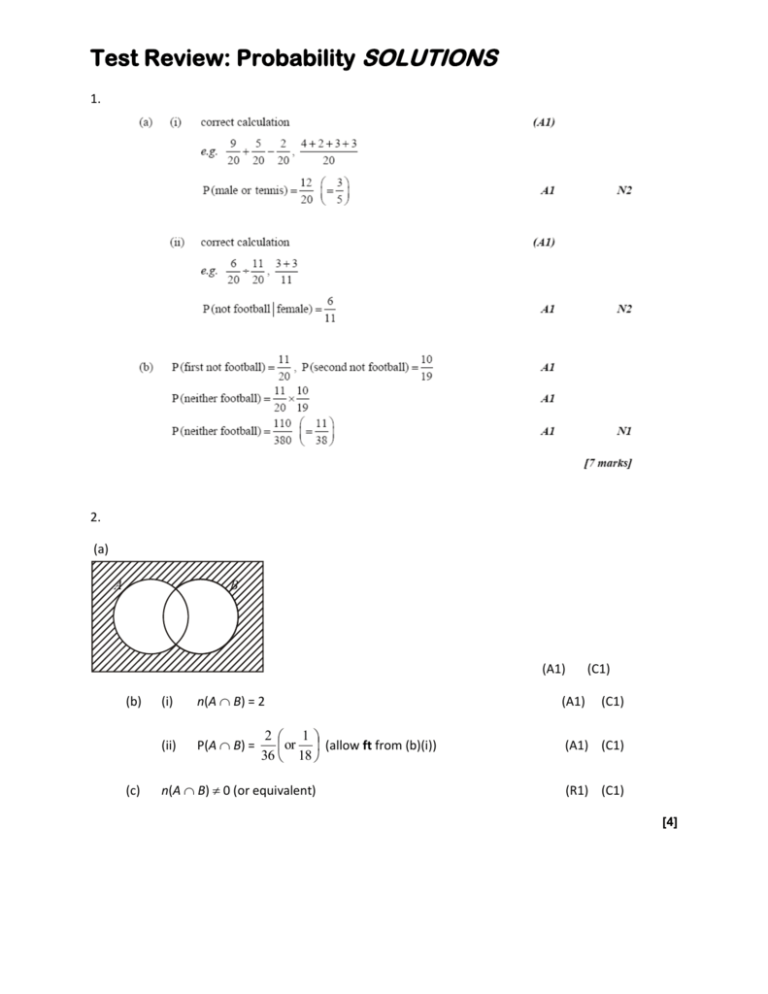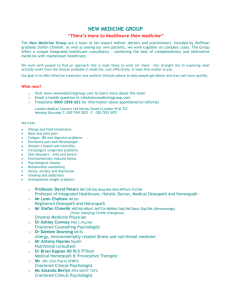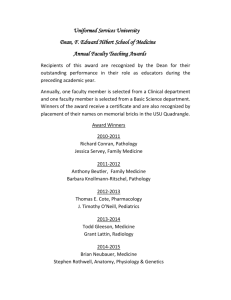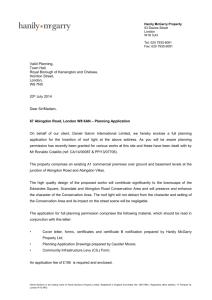Test Review: Probability SOLUTIONS
advertisement

Test Review: Probability SOLUTIONS 1. 2. (a) A B (A1) (b) (c) (i) n(A B) = 2 (ii) P(A B) = 2 1 or (allow ft from (b)(i)) 36 18 n(A B) 0 (or equivalent) (A1) (C1) (C1) (A1) (C1) (R1) (C1) [4] Test Review: Probability SOLUTIONS 3. p(Red) = 35 7 40 8 p(Black) = 8 1 7 p(one black) = 1 8 8 = 0.393 to 3 sf 1 (a) (i) ii) 5 1 40 8 7 p(at least one black) = 1 – p(none) 0 8 8 1 7 = 1 – 0 8 8 = 1 – 0.344 = 0.656 (M1)(A1) (A1) 3 (M1) (A1) (A1) 3 4. (a) P(A B) = P(A) + P(B) – P(A B) 1 3 7 P(A B) = 2 4 8 3 = 8 (b) (c) P( A B) P(AB) = P(B) 3 8 3 4 1 = 2 Yes, the events are independent (M1) (A1) (C2) (M1) (A1) (C2) (A1) (C1) EITHER P(AB) = P(A) (R1) (C1) OR P(A B) = P(A)P(B) (R1) (C1) [6] Test Review: Probability SOLUTIONS 5. (a) 7 8 1 4 L 3 4 L' 3 5 L 2 5 L' W 1 8 W' (A1)(A1)(A1)(A1) 7 1 3 Note: Award (A1) for the given probabilities , , in 8 4 5 the correct positions, and (A1) for each bold value. (b) Probability that Dumisani will be late is = (c) 47 (0.294) 160 P(WL) = (A1)(A1) (A1) (N2) 3 P(W L) P(L) P(W L) = P(L) = 7 1 1 3 8 4 8 5 4 7 1 8 4 47 160 7 P(WL) = 32 47 160 35 = (= 0.745) 47 (A1) (A1) (M1) (A1) (N3) 4 [11] Test Review: Probability SOLUTIONS 6. (a) (b) X ~ B(100,0.02) E(X) = 100 × 0.02 = 2 A1 100 (0.02)3(0.98)97 P(X = 3) = 3 = 0.182 (c) 1 (M1) A1 2 M1 (M1) A1 2 (M1) (A1) A1 2 A0 M1(ft) A1(ft) 2 METHOD 1 P(X > 1) = 1 – P(X 1) = 1 – (P(X = 0) + P(X = 1) = 1 – ((0.98)100 + 100(0.02)(0.98)99) = 0.597 METHOD 2 P(X > 1) = 1 – P (X 1) = 1 – 0.40327 = 0.597 Note: Award marks as follows for finding P(X > 1), if working shown. P(X 1) = 1 – P(X<2) = 1 – 0.67668 = 0.323 [6] 7. Note: Candidates may be using tables in this question, which leads to a variety of values. Accept reasonable answers that are consistent with working shown. W ~ N(2.5, 0.32) (a) (i) z = 1.67 (accept 1.67) P(W < 2) = 0.0478 0.0485) (ii) z=1 P(W > 2.8) = 0.159 (A1) (accept answers between 0.0475 and A1 N2 (A1) A1 N2 Test Review: Probability SOLUTIONS (iii) 2.5 kg A1A1 N2 Note: Award A1 for a vertical line to left of mean and shading to left, A1 for vertical line to right of mean and shading to right. (iv) Evidence of appropriate calculation M1 eg 1 (0.047790 + 0.15866), 0.8413 0.0478 P = 0.7936 Note: (b) (i) AG N0 The final value may vary depending on what level of accuracy is used. Accept their value in subsequent parts. X ~ B(10, 0.7935...) Evidence of calculation M1 eg P(X = 10) = (0.7935...)10 P(X = 10) = 0.0990 (3 sf) (ii) A1 N1 METHOD 1 Recognizing X ~ B(10, 0.7935...) (may be seen in (i)) (M1) P(X 6) = 0.1325... (or P(X = 1) + ... + P(X = 6)) (A1) evidence of using the complement (M1) eg P(X 7) = 1 P(X 6), P(X 7) = 1 P(X < 7) P(X 7) = 0.867 A1 N3 METHOD 2 Recognizing X ~ B(10, 0.7935...) (may be seen in (i)) (M1) For adding terms from P(X = 7) to P(X = 10) (M1) P(X 7) = 0.209235 + 0.301604 + 0.257629 + 0.099030 (A1) = 0.867 A1 N3 [13] Test Review: Probability SOLUTIONS 8. (a) evidence of binomial distribution (may be seen in parts (b) or (c)) eg np, 100 0.04 mean = 4 (b) A1 100 0.04 6 0.96 94 P(X = 6) = 6 = 0.105 (c) (M1) N2 (A1) A1 for evidence of appropriate approach eg complement, 1 P(X = 0) (M1) P(X = 0) = (0.96)100 = 0.01687... P(X 1) = 0.983 (A1) A1 N2 N2 [7] 9. (a) Let X be the lifespan in hours X ~ N(57, 4.42) a 0 b (i) a = –0.455 (3 sf) b = 0.682 (3 sf) (ii) (a) (b) (A1) (A1) P (X > 55) = P(Z > –0.455) = 0.675 (A1) 3 2 Z P (55 X 60) = P 4.4 4.4 P(0.455 Z 0.682) 0.6754 + 0.752 – 1 = 0.428 (3sf) (A1) (A1) OR P (55 X 60) = 0.428 (3 sf) (b) 90% have died shaded area = 0.9 0 (G2) 5 (M1) (A1) Hence t = 57 + (4.4 × 1.282) = 57 + 5.64 = 62.6 hours (M1) (A1) (A1) OR t = 62.6 hours (G3) 5 [10]






